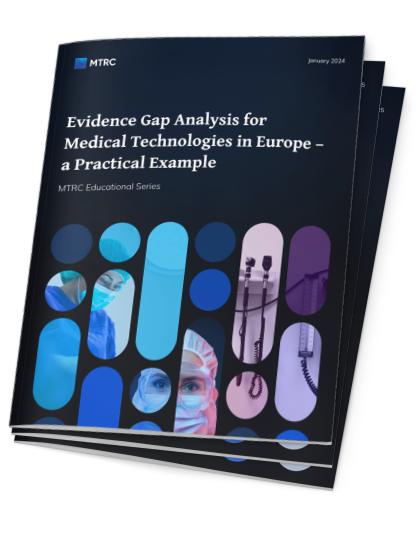Evidence gap analysis helps to optimize the investment into evidence generation for medical technologies, increase chances of success with market access, and reduce time to reimbursement.
Clinical and economic evidence is essential for obtaining market access for innovative technologies in Europe.
Evidence is required to assist reimbursement (e.g. creation of procedure code in Austria, Belgium, France, and the Netherlands) and funding (e.g. obtaining coverage in England and Switzerland) for hospital and ambulatory technologies.
In some countries, only clinical evidence is required, while in others, economic data is required as well (Belgium, England, the Netherlands, and Switzerland).
Companies struggle to understand what kind of data is required to support reimbursement processes. How many studies are necessary? What should be the duration of follow-up? What outcomes should be considered? What comparator should be selected?
Often, a clinical strategy is developed on the basis of the recommendations of the Clinical Advisory Boards, however, they do not take into account the position of the reimbursement decision-makers. Real decision-makers are almost impossible to get for the meeting about the evidence requirements. They are busy and most importantly, don't have a particular topical knowledge of a specific clinical field. In the projects, they are often replaced by proxies with not enough insights into the real drivers of decision-making.
MTRC offers a fact-based, unbiased approach to determining clinical and economic evidence requirements, based on the benchmarking to the prevision reimbursement decisions of reimbursement authorities and HTA organizations. Recommendations are also based on an in-depth understanding of the reimbursement pathways in individual markets.
How does it Work?
Our fact-based approach focuses on an in-depth analysis of the previous reimbursement/HTA recommendations
The first step in the project is understanding the market access barriers. This can include the creation of the procedure code, DRG change, add-on reimbursement, obtaining coverage decision by the payer, or recommendation by the health technology assessment (HTA) organization. Different processes could have very different evidence requirements
This is one of the key steps in the process and it includes an in-depth analysis of evidence requirements for several (4-5) technologies in a similar clinical field, which already obtained reimbursement or endorsement by HTA. Four-five cases are analyzed per process (e.g. NICE HTA or French HAS review). Information is extracted about the number of studies required for approval, design, need for systematic review, need for RCT/controlled studies, desired outcomes, duration of follow-up, sample size, need for local studies
Our team performs quick but solid analysis of evidence situation for the target technology. Both clinical and economic evidence is considered. A literature review is performed by our team or provided by the customer
In this step, the existing evidence for the technology is compared with the general evidence requirements for each target process (based on analysis of reference-benchmark cases) to identify the gaps
If evidence gaps are determined, our team develops holistic recommendations to bridge existing evidence gaps. This includes general recommendations and details about the design of the study (including outcomes, duration of follow-up, etc.)
Types of Evidence Gap Analysis
Depending on your needs and budget available, MTRC can offer two formats of support
Basic Evidence Gap Analysis
High-level review of evidence for target technology (1-page summary)
MTRC uses pre-selected reference cases from the internal research program
Summary of evidence requirements per reimbursement/HTA process
Limited information about the selection of clinical outcomes
Less expensive
Advanced Evidence Gap Analysis
In-depth review of evidence for target technology
De novo analysis of reference cases from the same clinical field for more detailed insights
Details of evidence requirements per reimbursement/HTA process
Details about the selection of clinical outcomes
More expensive
Get Insights from MTRC Free Analytical Reports
Explore free MTRC analytical reports and white papers for in-depth insights into evidence requirements for medical technologies in Europe

Explore MTRC research papers:
- Evidence Gap Analysis for Medical Technologies in Europe – a Practical Example (Report #3)
- Evidence Requirements for Interventional Procedures Program at NICE in the United Kingdom (Report #2)
- Evidence requirements for LPPR List process in France, part 1 (Report #5)
- Evidence requirements for coverage of medical technologies in the Netherlands (Report #9)
- Evidence requirements for medical devices in the regional HTA program in Italy (Report #11)
Get in Touch
Contact us to discuss your needs and learn about our services
